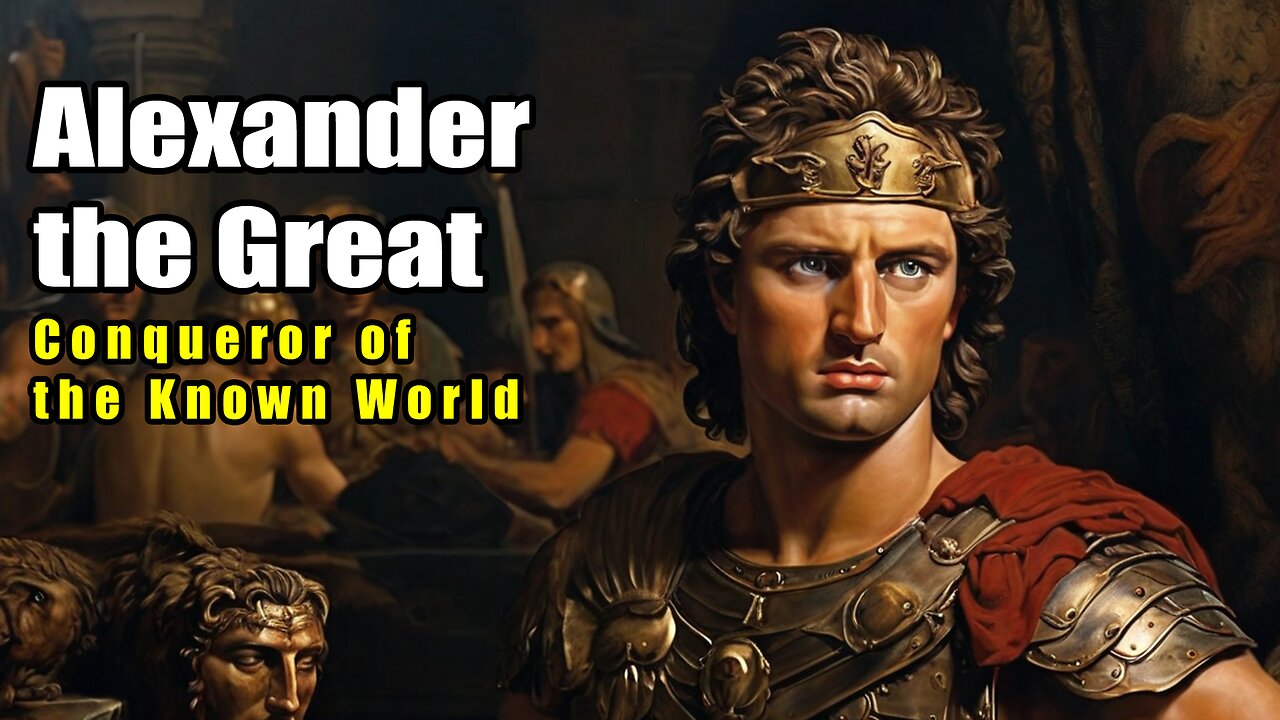Premium Only Content

Alexander the Great - Conqueror of the Known World (356 - 323 B.C.)
Alexander the Great, born in 356 B.C., was a king of Macedonia and one of the most successful military commanders in history. He became known for his remarkable conquests, spanning three continents, and left a lasting legacy that shaped the course of Western history. Here is an overview of Alexander the Great's life and achievements:
Early Life:
Birth and Education:
Alexander was born in Pella, the ancient capital of Macedonia, in 356 B.C. His parents were King Philip II of Macedonia and Queen Olympias.
As a young boy, he was tutored by the philosopher Aristotle, who instilled in him a love for literature, philosophy, and the arts.
Rise to Power:
Accession to the Throne:
At the age of 20, upon the assassination of his father, King Philip II, Alexander ascended to the throne of Macedonia in 336 B.C.
Military Campaigns:
Alexander quickly asserted his authority, securing his throne and embarking on a series of military campaigns to expand the Macedonian Empire.
Conquests:
Battle of Issus (333 B.C.):
In 333 B.C., Alexander defeated Persian King Darius III at the Battle of Issus, establishing himself as a formidable military leader.
Siege of Tyre (332 B.C.):
After a challenging siege, Alexander conquered the heavily fortified city of Tyre in 332 B.C., demonstrating his strategic brilliance.
Conquest of Egypt (332 B.C.):
Alexander was welcomed as a liberator in Egypt, where he founded the city of Alexandria and was declared Pharaoh by the Egyptians.
Battle of Gaugamela (331 B.C.):
The decisive Battle of Gaugamela in 331 B.C. led to the fall of the Achaemenid Persian Empire, solidifying Alexander's control over the region.
Persian Empire:
Alexander continued his conquests eastward, reaching as far as India. His vast empire stretched from Greece to Egypt, Persia, and parts of India.
Legacy and Achievements:
Cultural Exchange - Hellenistic Period:
Alexander's conquests resulted in a significant cultural exchange known as the Hellenistic Period. Greek influence spread across the known world, influencing art, literature, and philosophy.
City Building:
Alexander founded numerous cities, many of which were named Alexandria, strategically placed for trade and cultural exchange. The most famous is Alexandria in Egypt.
Marriage Policy:
To foster unity among his conquered territories, Alexander adopted a marriage policy, encouraging his generals to marry Persian princesses.
Death and Succession:
In 323 B.C., Alexander died in Babylon under mysterious circumstances, possibly due to illness or poisoning. His death led to a power struggle among his generals, known as the Wars of the Diadochi.
Cultural Impact:
Spread of Greek Language and Ideas:
The conquests of Alexander facilitated the spread of the Greek language (Koine Greek) and Greek ideas throughout the known world, contributing to a shared cultural and intellectual foundation.
Hellenistic Civilization:
The Hellenistic period that followed Alexander's conquests saw the blending of Greek, Persian, Egyptian, and Indian cultures, creating a diverse and rich civilization.
Conclusion:
Alexander the Great's military genius, leadership, and vision for a unified world left an indelible mark on history. While his empire did not long survive his death, the cultural legacy of Hellenistic civilization endured for centuries, shaping the development of Western and Eastern cultures alike. The story of Alexander's conquests continues to captivate historians and scholars to this day.
-
 1:09:52
1:09:52
vivafrei
4 hours agoCBS News "Debunks" The Blaze Pipe Bomber Story? Thomas Massie Threatened by Kash Patel? AND MORE!
38.3K19 -
 1:21:16
1:21:16
The White House
7 hours agoVice President JD Vance Celebrates Thanksgiving with Servicemembers and Delivers Remarks
33.7K16 -
 59:49
59:49
The Quartering
4 hours agoMTG MELTDOWN On X, Hasan Piker Runs From Ben Shapiro & AI Nightmare!
112K44 -
 1:16:24
1:16:24
DeVory Darkins
5 hours agoDISTURBING: Eric Swalwell left DUMBFOUNDED after he gets confronted about trans athletes
95.6K53 -
 2:06:36
2:06:36
Side Scrollers Podcast
7 hours agoThis is the Dumbest Story We’ve Ever Covered… | Side Scrollers
51.2K10 -
 1:13:26
1:13:26
Steven Crowder
9 hours ago🔴 Jay Dyer on Hollywood, The Occult, and the Attack on the American Soul
276K207 -
 1:26:28
1:26:28
Sean Unpaved
7 hours agoNFL Thanksgiving Games Are Going To Be ELECTRIC! | UNPAVED
38.7K5 -
 29:07
29:07
The Rubin Report
8 hours agoAre Megyn Kelly & Erika Kirk Right About Our Political Divisions?
79.8K59 -
 27:09
27:09
VINCE
9 hours agoSaving America's Schools with Norton Rainey | Episode 177 - 11/26/25 VINCE
192K99 -
 2:03:57
2:03:57
Benny Johnson
8 hours agoFBI Director Kash Patel Makes January 6th Pipe Bomber Announcement: Massive Breakthrough, Stay Tuned
144K124